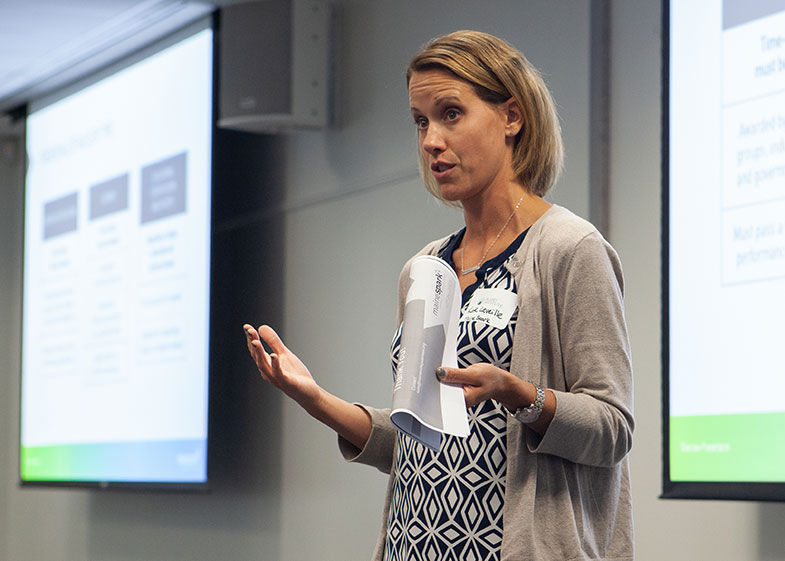Credential of Value. It’s a fairly new term in the world of education and workforce development and can mean different things depending on where you live and what vocational opportunities you have access to. According to MaineSpark, a statewide workforce development initiative powered by a coalition of education and business leaders, a credential of value is training or education beyond a high school diploma that leads to a job in the current economy.
In many of Maine’s island and coastal communities, a lobster license is a very valuable credential, one that fishermen sometimes have to wait years for. A bachelor’s degree is another example, especially in certain areas such as STEM, but the staggering debt that many students take on in order to attain this credential can diminishes its value, at least in the short term. Two year and technical college degrees, as well as professional certifications, licenses, and trade credentials are also credentials of value, particularly in specific sectors along Maine’s coast, such as education and health, retail, professional services including the trades, arts, recreation and tourism and natural resource extraction, including fishing. (Waypoints 2018)
As a former school counselor, I’ve seen a positive shift in how schools are helping students prepare for life after high school. For years, we encouraged all students to go to a 4-year college. I completely agree with the ‘think big, anything is possible’ intent of that approach, and for many students, a bachelor’s degree is still by far the best way to maximize lifetime earning potential and have a satisfying career. For a significant number of students though, attaining a bachelor’s degree is neither realistic nor desired and pursuing this path to the exclusion of other credentials of value, has left many students with college debt but no degree, and without the training or skills to connect to a good job.

Source: Maine Department of Education
The outdated ‘bachelor’s degree only’ definition of postsecondary success is one of many factors that has contributed to the workforce crisis that Maine is now in. We must encourage students from early on in their school careers to graduate high school with a plan that considers the postsecondary pathway that fits their goals. Schools must provide students with high quality academic preparation needed for success in college AND relevant work-based learning through increased access to CTE (Career and Technical Education). More access to internships and mentorship programs will also help students build their own pathway to the credential(s) of value that meet their interests and the needs of Maine’s current and future economy.
At this year’s annual Island Teachers Conference, our keynote speaker, Kate Levielle project manager for MaineSpark, explained the challenges of Maine’s workforce needs. For example, in 2018, only 43% of Mainers hold education and workforce credentials of value, but in order to meet the projected demands of the 2025 economy, Maine will need an increase of 158,000 skilled workers or 60% of Mainers holding a credential of value. This gap amounts to a workforce crisis. You already know this if you live in a small coastal town and have tried to find a local trades person to fix your furnace! And you’ve likely already heard about some of the other related trends: that Maine is the oldest state in the nation, that Maine’s economy has not grown much in the past 10 years, and that neither trend is predicted to change much in the coming decade.
Kate also shared some good news about the steps that the business, industry and education communities in Maine are taking to improve these numbers through the MaineSpark initiative. MaineSpark has been created to help develop a coordinated state-wide approach to addressing our workforce challenges by setting goals, identifying strategies and building coalitions. MaineSpark has the goal that 60% of Mainers will attain a credential of value by 2025 and has four tracks to achieve this goal: Strong Foundations for children from birth through 6th grade, Future Success for students from 6th grade through post-secondary education, Adult Promise for adults looking to earn credentials or change careers, and New Opportunities for professionals looking to move or begin new careers in Maine.
The Island Institute’s Education Team is a proud member of the MaineSpark Future Success track and we are doing our part to help ensure that the young people in Maine’s island and coastal communities are part of how we meet our common goal of 60% by 2025. For years, the Island Institute has supported the college aspirations of island students through our scholarship programs and we continue to improve and expand this work. At the same time, we recognize that we need to do more, and are now in the process of developing projects that support students as they consider ALL postsecondary pathways, including the identification and attainment of credentials of value that are right for the student, for their community and for Maine.
We are grateful to Kate and MaineSpark for being part of our annual conference, and we look forward to working with Maine’s island and coastal students, along with their teachers, schools and communities, as they develop postsecondary plans and attain credentials of value.

Jack Sullivan / Island Institute
The Island Institute Education team


